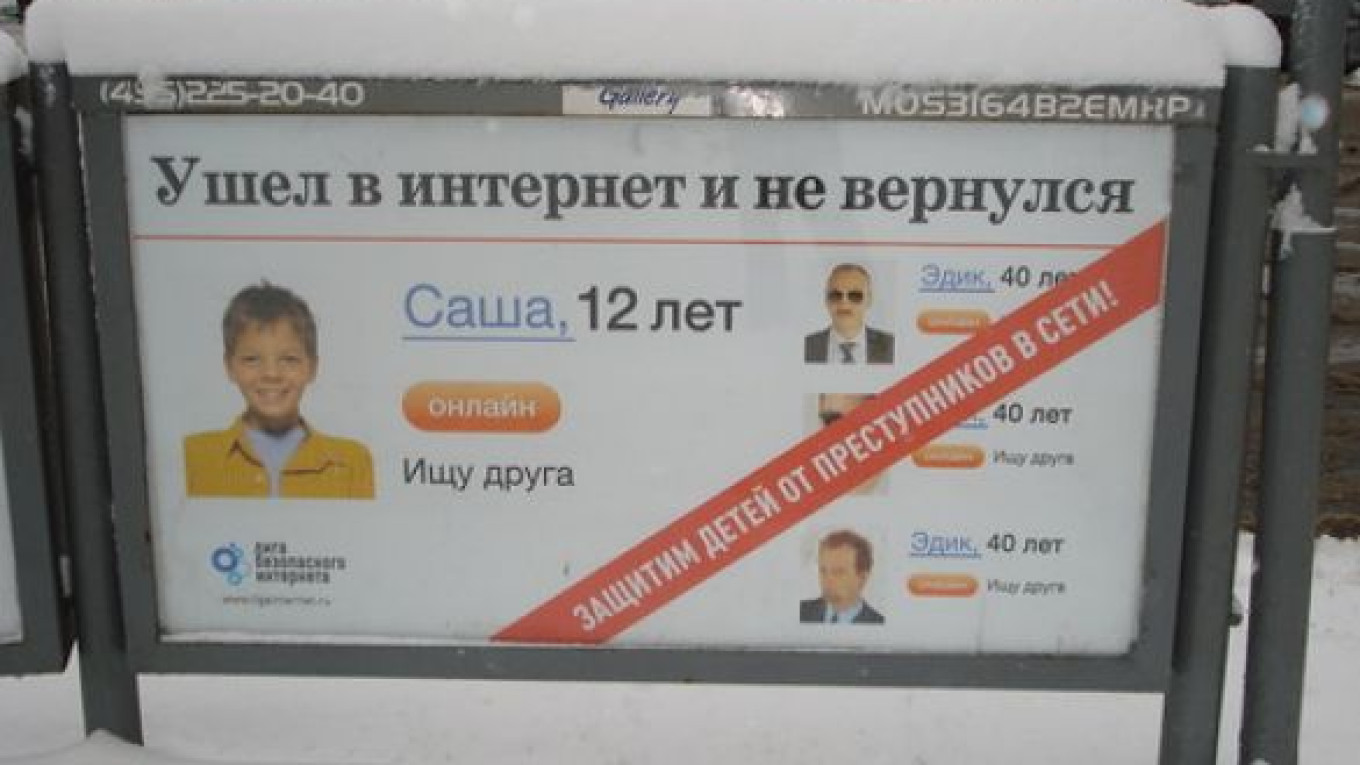The government's plans to protect children from harmful online content are causing increasing alarm among anti-censorship activists, who see one region's plans to introduce a smut-free version of the Internet as the latest move to banish distasteful speech.
Details of the Kostroma region's plan, which appeared in the media last week, sparked talk of a "white list" to accompany the federal government's existing blacklist of websites that are deemed to contain extremist information or child pornography, or promote bad behavior.
The plan would give net denizens in Kostroma, a mostly rural region about 190 kilometers northeast of Moscow, the option between using the existing Internet, with all its dangerous and unsavory corners, and a "clean" version, consisting of hundreds of thousands of inoffensive websites.
A non-governmental organization called the Safe Internet League, which has close links to both the Kremlin and the Russian Orthodox Church, has already picked 400,000 websites safe for children, and the number is growing, the Kostroma regional administration said Wednesday in a statement.
News reports quoting the league's acting director, Denis Davydov, as saying that a strict parental control option would be the default, meaning that users would have to opt out rather than in, quickly sent bloggers and free-speech activists into a frenzy.
Connectivity advocate Matvei Alexeyev said the initiative was probably illegal — Article 29 of the Constitution guarantees the right to "freely seek, receive, transmit, produce and distribute information by any legal way" — not to mention technically unfeasible.
There are more than 633 million website in the world, according to a recent estimate, Alexeyev wrote Friday in a blog post on . "When will the site-by-site check be finished? In 200 years?"
Even government ministers have entered the fray. Communications and Press Minister Nikolai Nikiforov implied that it was illegal for one region to limit web surfers to a "white list" of pre-screened sites, Interfax reported.
Furthermore, the Federal Mass Media Inspection Service's blacklist, which was expanded in November over critics' objections to include websites deemed to include child pornography or promote suicide and drug use, is the only legal vehicle for filtering out harmful content, he said.
Almost a hundred child pornography sites have been closed this year in Russia at the request of foreign law enforcement agencies, Russian Interpol official Tatyana Shishova said at a news conference on Monday, the day before Safer Internet Day, part of an European Union-backed international awareness campaign.
Some cast a critical eye on the Safe Internet League, the non-governmental organization that helped develop the November law, which Public Chamber member and journalism professor Ivan Zassoursky described as a "conservative lobbying structure," in an? interview Friday with Ekho Moskvy radio.?
The chairman of the of trustees is Igor Shchyogolev, an aide to President Vladimir Putin who served as communications and press minister from 2008 to 2012 under then-President Dmitry Medvedev.
The league was founded by the Saint Basil the , a group with close links to the Russian Orthodox Church and a $40 million yearly budget, whose board of directors includes Shchyogolev, Putin-friendly actor and director Nikita Mikhalkov, and chairman Konstantin Malofeyev, the largest minority shareholder of state-owned telecom firm Rostelecom.
But an official with the group denied that it is an arm of the church, which Putin has given an increasing role in dictating public morality, and said the media had missed the point of the proposal.
Several of the country's telecom companies, including Rostelecom, MTS, Beeline, and MegaFon, are league members, and their dues support the group's advocacy efforts, said Valery Ponomaryov, assistant to acting director Davydov.
"Parental control," not "white list," more accurately described the proposal, he said. On the more critical question of whether a clean Internet would be the default option, Ponomaryov deferred to Internet service providers, saying they would be the ones to decide.
Ponomaryov said he is personally in favor of the default option, arguing that it was "sensible" because opinion polls "showed that up to 70 percent" are in favor of it.
Asked to provide evidence of that claim, Ponomaryov directed a reporter to a January study by the Public Opinion Foundation, which found that 43 percent of Russians supported banning certain websites without court approval.
Parental control will only be turned on with the "permission of users," the government's press release said. Negotiations between the league, the Kostroma administration, and Internet service providers are ongoing, and an agreement is expected in the first quarter of this year, it said.
Earlier, Ponomaryov told Gazeta.ru that the league was in negotiations to have similar systems introduced in the Lipetsk, Ulyanovsk and Leningrad regions.
Contact the author at [email protected]
Related articles:
A Message from The Moscow Times:
Dear readers,
We are facing unprecedented challenges. Russia's Prosecutor General's Office has designated The Moscow Times as an "undesirable" organization, criminalizing our work and putting our staff at risk of prosecution. This follows our earlier unjust labeling as a "foreign agent."
These actions are direct attempts to silence independent journalism in Russia. The authorities claim our work "discredits the decisions of the Russian leadership." We see things differently: we strive to provide accurate, unbiased reporting on Russia.
We, the journalists of The Moscow Times, refuse to be silenced. But to continue our work, we need your help.
Your support, no matter how small, makes a world of difference. If you can, please support us monthly starting from just $2. It's quick to set up, and every contribution makes a significant impact.
By supporting The Moscow Times, you're defending open, independent journalism in the face of repression. Thank you for standing with us.
Remind me later.


